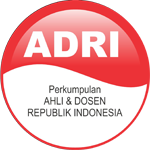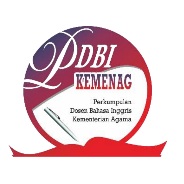Online Learning amidst Global Pandemic: EFL Students’ Challenges, Suggestions, and Needed Materials
Abstract
Covid-19 pandemic brings changes in many aspects of peoples’ lives throughout the world. The spread of Covid-19 in Indonesia affects the education system in this country. Face-to-face instructions are shifted into full online learnings from home. Despite this quite drastic change, the literature on students’ insights of this matter has still been silent. Thus, the present study elucidates 45 EFL students’ challenges, suggestions and needed materials during these online classes. Rely on qualitative data analysis from written responses and semi-structured interviews, the findings disclosed that these EFL students’ main challenges in attending online courses were the unsteady networks and the less direct interactions. These students mainly suggested the use of video conferencing applications such as zoom or Google meet, though some students chose assignments over those applications. The students also mentioned that they basically needed grammar related materials within the online classes. The findings bring forward the picture of full online learning condition during Covid-19 outbreak on EFL setting in Indonesia.
Keywords
Full Text:
PDFReferences
Adnan, M. & Anwar, K. (2020). Online Learning amid the COVID-19 Pandemic: Students Perspectives. Journal of Pedagogical Sociology and Psychology, 2(1), 45-51.
Al-Jarf, R. (2016). Teaching Vocabulary to EFL College Students Online. CALL-EJ Online, 8(2), 1-16.
Al-Munawwarah, S. F. (2015). Teachers’ Perceptions on the Use f ICT in Indonesian EFL Learning Context. English Review: Journal of English Education, 3(1), 70–80.
Al Zumor, A. W. Q., Al Refaai, I. K., Eddin, E. A. B., & Al-Rahman, F. H. A. (2013). EFL Students’ Perceptions of a Blended Learning Environment: Advantages, Limitations and Suggestions for Improvement. English Language Teaching, 6(10), 95–110.
Alaidarous, K., & Madini, A. A. (2016). Exploring EFL students’ perception in blended learning environment in Saudi technical education context. International Journal of Educational Investigations, 3(6), 69–81.
Alebaikan, R., & Troudi, S. (2010). Blended learning in Saudi universities: challenges and perspectives. ALT-J, 18(1), 49–59.
Ali, W. (2020). Online and Remotes Learning in Higher Education Institutes: A Necessity in Linght of Covid-19 Pandemic. Higher Education Studies, 10(3), 16-25.
Amin, F. M., & Sundari, H. (2020). EFL students’ preferences on digital platforms during emergency remote teaching: Video Conference, LMS, or Messenger Application? Studies in English Language and Education, 7(2), 362-378. doi.org/10.24815/siele.v7i2.16929.
Apriani, E. (2016). A New Literacy: The role of technology to develop student’s character. Ta'dib: Journal of Islamic Education (Jurnal Pendidikan Islam), 21(1), 59-72.
Apriani, E., & Hidayah, J. (2019). The ICT Used by the English Lecturers for Non-English Study Program Students at IAIN Curup. Vision: Journal for Language and Foreign Language Learning, 8(1), 26-37.
Apriani, E., Supardan, D., Sartika, E., Suparjo, S., & Hakim, I. N. (2019). UTILIZING ICT TO DEVELOP STUDENT’S LANGUAGE ETHIC AT ISLAMIC UNIVERSITY. POTENSIA: Jurnal Kependidikan Islam, 5(1), 1-14.
Arkoful, V. & Abaido, N. (2014). The role of e-learning, the advantages and disadvantages of its adoption in higher education. International Journal of Education and Research, 2(12), 397-410.
Ashrafzadeh, A., & Sayadian, S. (2015). University instructors’ concerns and perceptions of technology integration. Computers in Human Behavior, 49, 62–73.
Atmojo, A. E. P. & Nugroho, A. (2020). EFL Classes Must Go Online! Teaching Activities and Challenges during COVID-19 Pandemic in Indonesia. Register Journal, 13(1), 49-76. doi: 10.18326/rgt.v13i1.49-76.
Bailey, D. R. & Lee, K. R. (2020). Learning from Experience in the Midst of Covid-19: Benefits, Challenges, and Strategies in Online Teaching. Computer-Assisted Language Learning Electronic Journal, 21(2), 178-198.
Barkhuizen, G. (2014). Revisiting narrative frames: An instrument for investigating language teaching and learning. System, 47, 12–27.
Basak, S. K., Wotto, M., & Belanger, P. (2018). E-learning, M-learningand D-learning: Conceptual Definition and Comparative Analysis. E-Learning and Digital Media, 15(4), 191-216. DOI: 10.117/2042753018785180.
Baz, E. H. (2016). Attitudes of Turkish EFL Student Teachers towards Technology Use. Turkish Online Journal of Educational Technology-TOJET, 15(2), 1–10.
Harding, J. (2018). Qualitative data analysis: From start to finish. SAGE Publications Limited.
Hollweck, T. (2015). Robert K. Yin.(2014). Case Study Research Design and Methods . Thousand Oaks, CA: Sage. 282 pages. Canadian Journal of Program Evaluation, 30(1).
Inderawati, R., Sofendi, Purnomo, E. M., Vianty, M., Suhendi, D. (2019). Students Engagement in Utilizing Technology for Learning Support. English Franca: Academic Journal of English Language Education, 3(1), 182-196. dx.doi.org/10.29240/ef.v3i02.1111
Ja’ashan, M. M. N. H. (2015). Perceptions and Attitudes Towards Blended Learning for English Courses: A Case Study of Students at University of Bisha. English Language Teaching, 8(9), 40–50.
Kirovska-Simjanoska, D. (2019). Digital vs in-Person Learning Environment in ESP Classrooms: Let the Students Decide. SEEU Review, 14(1), 36–68.
Lam, Y. W., Hew, K. F., & Chiu, K. F. (2018). Improving argumentative writing : Effects of a blended learning approach and gamification. ELT Journal, 22(1), 97–118.
Lee, J. S. (2019). Informal digital learning of English and second language vocabulary outcomes: Can quantity conquer quality? British Journal of Educational Technology, 50(2), 767–778. https://doi.org/10.1111/bjet.12599
Lee, J. S., & Lee, K. (2019). Informal digital learning of English and English as an international language: The path less traveled. British Journal of Educational Technology, 50(3), 1447–1461. https://doi.org/10.1111/bjet.12652
Nartiningrum, N. & Nugroho, A. (2020). Classroom Activities for Teaching Speaking: Voices of Indonesian EFL Learners. Jurnal Pendidikan Bahasa, 9(1), 35-46. doi.10.31571/bahasa.v9i1.1689
Nguyen, T. (2015). The Effectiveness of Online Learning: Beyond No Significant Differences and Future Horizons. MERLOT Journal of Online Learning and Teaching, 11(2), 309-319.
Nugroho, A., & Rahmawati, A. (2020). "Let’s Write A Caption!”: Utilizing Instagram to Enhance ESP Students’ Writing Skills, JURNAL BASIS, 7(1), 1–12. https://doi.org/10.33884/basisupb.v7i1.1782
Nugroho, A., Zamzami, M. R. A., & Ukhrowiyah, N. F. (2020). Language input , learning environment , and motivation of a successful EFL learner. Journal on English as a Foreign Language ( JEFL ), 10(1), 46–69. https://doi.org/10.23971/jefl.v10i1.1511
Nugroho, A. & Mutiaraningrum, I. (2020). EFL teachers' beliefs and practices about digital learning of English. Edulite: Journal of English Education, Literature, and Culture, 5(2), 304-321. https:// doi.org/10.30659/e.5.2.304-321
Nugroho, A. & Atmojo, A. E. P. (2020). Digital learning of English beyond classroom: EFL learners' perception and teaching activities. Journal of English Education and Linguistics Studies, 7(2), 219-243. https://doi.org/10.30762/jeels.v7i2.1993
Poedjiastutie, D., Rif'ah Lailatul (2019). English Communication Needs of Engineering Students. International Journal of Language and Linguistics, 7(2), 69. https://doi.org/10.11648/j.ijll.20190702.13
Polisda, Y. (2017). Peer Review: A Stretegy to Improve Students' Academic Essay Writings. English Franca: Academic Journal of English Language and Education, 1(1), 45-60. http://dx.doi.org/10.29240/ef.v1i1.157
Sabti, A. A., & Chaichan, R. S. (2014). Saudi high school students’ attitudes and barriers toward the use of computer technologies in learning English. SpringerPlus, 3(1), 1–8.
Sudrajat, W. N. A., & Astuti, E. R. (2018) Students' Perceptions of the Use of TOEFL Preparation Online Course on the Test Perforrmance: the Case of TOEFL Structure and Written Expression Test. HUMANIORA, 9(3), 275-282.
Sun, A., & Chen, X. (2016). Online education and its effective practice: A research review. Journal of Information Technology Education: Research, 15, 157-190.
Suramto. (2019). Developing the Students' English Listening Skill by Applying Drama Movies Viewing Techniques. English Franca: Academic Journal of English Language Education, 3(1), 97-108. http://dx.doi.org/10.29240/ef.v3i01.819
Tanveer, M. (2011). Integrating E-learning in Classroom-based Language Teaching: Perceptions, Challenges and Strategies. … Conference “ICT for Language Learning.” http://conference.pixel-online.net/ICT4LL2011
Uukkivi, A., & Labanova, O. (2017). E-learning materials, methods and tools to activate students. New learning scenarios in digitalized world: international workshop, page 31-39.
Yin, R. K. (2015). Qualitative research from start to finish. Guilford publications.
DOI: http://dx.doi.org/10.29240/ef.v4i2.1494
Refbacks
- There are currently no refbacks.
Copyright (c) 2020 Novrika Nartiningrum, Arif Nugroho

This work is licensed under a Creative Commons Attribution-NonCommercial-ShareAlike 4.0 International License.
INDEXED BY:
 This work is licensed under a Creative Commons Attribution-NonCommercial-ShareAlike 4.0 International License
This work is licensed under a Creative Commons Attribution-NonCommercial-ShareAlike 4.0 International License
@ ENGLISH FRANCA : Academic Journal of English Language and Education
Jl. Dr. AK Gani No 1 Dusun Curup, Rejang Lebong Regency, Bengkulu Province, Indonesia, 39119.
Dr. Eka Apriani, M.Pd., email: efranca@iaincurup.ac.id, eka.apriani@iaincurup.ac.id.




.png)












